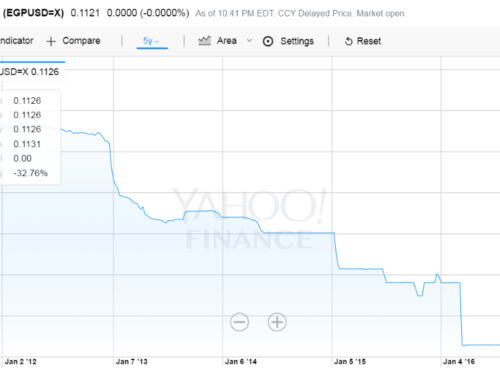
The authors of the draft constitution that will be presented for approval to Egyptian voters over the next few days have quietly erased a provision of utmost importance to the country’s entrepreneurs: Article 17 of the previous constitution, which held that “the state will nurture craft industries and small enterprises.” The new constitution‘s much watered-down article reads: “The state encourages the private sector to perform its social responsibility in serving the national economy and society” (Article 36).
This is probably the most revealing declaration by the post-Morsi transition government on entrepreneurship and small business development. Six months into their rule, it is only fitting that we ask: Is there room for entrepreneurship in today’s Egypt?
In November, entrepreneurial optimism overtook Cairo during theRiseUp Summit, a local entrepreneurship conference whose list of participants reads like a Who’s Who of the Egyptian business-creation ecosystem. Participants discussed everything from personal success stories to fundraising and advertisement tips for startups.
The Summit was held at the new campus housing investor and visionary Ahmed Alfi’s latest, ambitious project: the Tahrir Alley Technology Park(TATP), which hopes to become a “mini-Silicon Valley” that will attract both established and budding technology ventures. Now housed at the old location of the American University in Cairo, when it was known as the “Greek Campus,” the TATP residents have played up their geek credentials and renamed it “the GrEEK campus” (as seen in the photo above).
Many hope that this collegiate environment, clearly inspired by American tech campuses, will encourage Egyptian knowledge entrepreneurship and ultimately help the stumbling Egyptian economy get back on its feet. And if you had a chance to look at the fresh-faced entrepreneurs demoing their products or listen to the tech community standouts sharing their wisdom and experience, you could be forgiven for thinking that just about anything was possible.
The spirited, hopeful environment in the wake of the Egyptian revolution certainly favored entrepreneurial growth. Research conducted by Hala Hattab, assistant professor of entrepreneurship at the British University in Cairo, as well as the Global Entrepreneurship Monitor, noted that Egyptians immediately after the 2011 revolution displayed a striking interest in starting their own companies and breaking from the traditional employment mold: According to these studies, 1.4 million Egyptians qualified as nascent entrepreneurs and 2.2 million had become owners of new firms, a significant rise from the pre-revolutionary period.
But that was nearly three years ago. Now Dr. Hattab has the impression that we might have failed to harness that entrepreneurial zeal.
“While there was a very high public perception of entrepreneurs immediately after the revolution,” Hattab noted, “my impression is that, despite the large activity in terms of competitions and entrepreneurship support initiatives, we aren’t seeing a rise in entrepreneurship.” Part of the blame, she says, lies on the entrepreneurship community’s bias towards technology companies.
“The public has come to perceive entrepreneurs as either people with a stellar educational record or people with massive projects of national impact, such as renewable energies or recycling,” says Hattab. As such, “many people who have ideas for projects are worried they’re not really ‘entrepreneurs,’ since they don’t fit this very restrictive perception, and are discouraged from the start.”
What’s more, entrepreneurs do not operate in a vacuum.
During the RiseUp Summit, for example, it was impossible to deny Egypt’s political reality. Within the conference hall, we maintained the illusion of a trendy normalcy (or of Silicon Valleyhood, if you wish), sipping juice out of test tubes and eating stale pretzels — but just 130 feet down the road, in Tahrir Square, police forces were barricading the roads in anticipation of protests planned by the outlawed Muslim Brotherhood. Luckily, there was no violence between the soldiers and protesters that day (the demonstrators simply rerouted their march). But if violence had ensued, we would have been unable to defend our entrepreneurial bubble from the seeping tear gas.
Egypt’s entrepreneurs aren’t only at risk of collateral damage from the general turmoil they’re often subject to much more pointed oppression. In late November, a local Startup Weekend — a marathon business plan development session organized for budding entrepreneurs — was raided by the police. The authorities were likely alerted by the neighborhood’s residents who, having lived for decades under a government that values conformity, saw the gathering of young people as a bad omen. The police stormed the gathering and, despite finding nothing more than groups of young people engaged in discussions on software development and revenue streams, proceeded to hold them at gunpoint for two and a half hours, confiscating their mobile phones and photographing their flipcharts. The participants, huddled in a corner with their whiteboard markers still in hand, were naturally extremely distressed. Noha Mahmoud, a young and brilliant serial entrepreneur, told me weeks later that she was still suffering symptoms of post-traumatic stress, and said she was seriously considering moving back to London or California.
The Startup Weekend event might have been a unique misunderstanding — one which no one apologized for — but it is symptomatic of a regime that finds the spirit of initiative threatening, and considers free thinking a public enemy. This government will not be a partner in developing and strengthening a fertile entrepreneurial environment.
Dr. Hattab, for her part, thinks that it might be judicious to lower our expectations of the government. “It’s just a transitional government after all,” she explains. “They will be around for a few months at most — we should not be expecting much out of them.” In the meantime, Hattab recommends that the entrepreneurship community figure out what it needs from the state. “We need to have a clear agenda to communicate with the government, even a transitional one.”
Egyptian entrepreneurs have endured worse, and will undoubtedly power through despite everything, thanks to ongoing private efforts and initiatives. Though they should have been able to count on the government to pave the road, it’s just become yet another obstacle to circumvent or, as they’ve always done, ignore.
Originally published on Foreign Policy: Transitions.



